 Petzlover
Petzlover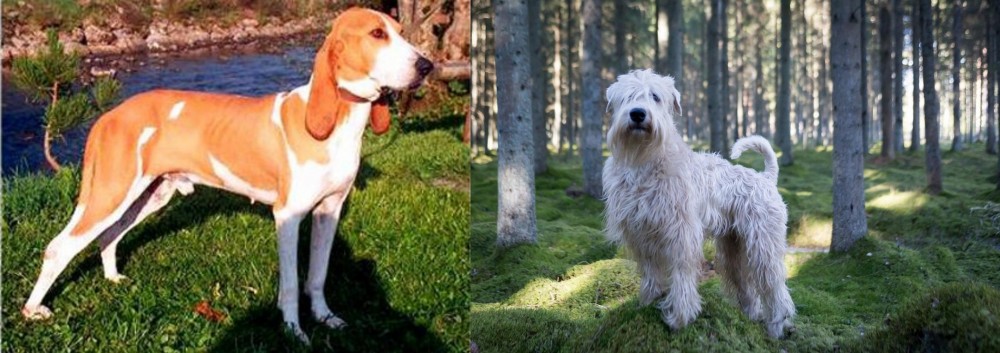 Schweizer Laufhund is originated from Switzerland but Soft-Coated Wheaten Terrier is originated from United Kingdom. Schweizer Laufhund may grow 9 cm / 4 inches higher than Soft-Coated Wheaten Terrier. Both Schweizer Laufhund and Soft-Coated Wheaten Terrier are of same weight. Schweizer Laufhund may live 3 years less than Soft-Coated Wheaten Terrier. Both Schweizer Laufhund and Soft-Coated Wheaten Terrier has almost same litter size. Schweizer Laufhund requires Low Maintenance. But Soft-Coated Wheaten Terrier requires Moderate Maintenance
Schweizer Laufhund is originated from Switzerland but Soft-Coated Wheaten Terrier is originated from United Kingdom. Schweizer Laufhund may grow 9 cm / 4 inches higher than Soft-Coated Wheaten Terrier. Both Schweizer Laufhund and Soft-Coated Wheaten Terrier are of same weight. Schweizer Laufhund may live 3 years less than Soft-Coated Wheaten Terrier. Both Schweizer Laufhund and Soft-Coated Wheaten Terrier has almost same litter size. Schweizer Laufhund requires Low Maintenance. But Soft-Coated Wheaten Terrier requires Moderate Maintenance
 The Schweizer Laufhund is a breed born in Switzerland and sought after by the French and the Italians for their skill at hunting small mammals, especially hare. Mercenaries brought scent hounds from France to Switzerland and cross bred them with the Schweizer Laufhund, thereby influencing and changing the native breed.
The Schweizer Laufhund is a breed born in Switzerland and sought after by the French and the Italians for their skill at hunting small mammals, especially hare. Mercenaries brought scent hounds from France to Switzerland and cross bred them with the Schweizer Laufhund, thereby influencing and changing the native breed.
In 1882 it was established that within the breed of “Swiss Hound” (Schweizer Laufhund) there were five different varieties. At this time a standard was written for each of these five different types. By 1909 the standards were revisited and revised, eliminating the hound of Thurgovie. Then in 1933 it was decided that one standard would cover all the varieties of the Schweizer Laufhund.
The Schweizer Laufhund was a line used to develop many different scent hounds. They are used almost exclusively as hunting dogs and not as family companion dogs. St. Hubert Jura Hound, the rare ancient variety, is still in the hunting parties of Canada and France. The breed existed before any dog breeding written records were kept. In Switzerland from the middle ages on, the Schweizer Laufhund was the only hunting dog in the country until recent times.
Even though they didn’t have any popularity until the European nobility became enamored of them in the middle ages, it is thought by some that they date back to the Roman Empire. In actuality most of their pre- Swiss history has been lost. We do know that through the years the breed has been influenced by cross breeding with Austrian, German and French scent hounds.
He is not recognized by the larger kennel clubs such as AKC or UKC, but by some rare breed associations. The dogs that remain today in the United States, Canada and Europe are still mainly owned by either active or retired hunters. Despite their great personalities, they are still not numerous among family pets.
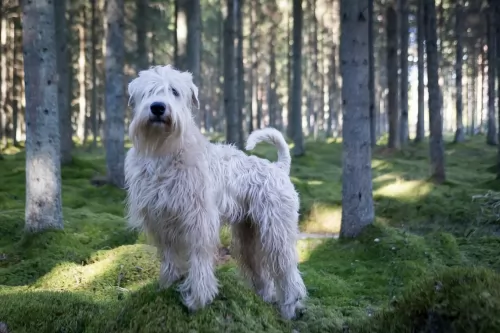 This wheaten colored terrier hails from Ireland. Although the Wheaten has been around for a long time, it was in 1937 that he was recognized as a breed in Ireland.
This wheaten colored terrier hails from Ireland. Although the Wheaten has been around for a long time, it was in 1937 that he was recognized as a breed in Ireland.
The British Kennel Club also recognized the Wheaten and the dog was also exported to the United States. Serious interest started being shown for the Terrier in the 1970s. It was in 1973 that they were recognised by the American Kennel Club.
 A medium sized dog with good endurance and strength. Its head is lean, and its muzzle is long making this a very noble looking breed. Each of the 5 varieties has some of its own characteristics. They all have short, fine hairs on their ears and heads and longer hairs on their legs and back.
A medium sized dog with good endurance and strength. Its head is lean, and its muzzle is long making this a very noble looking breed. Each of the 5 varieties has some of its own characteristics. They all have short, fine hairs on their ears and heads and longer hairs on their legs and back.
• Bernese – White with a black saddle or black patches and tan on the ears and face.
• Lucernese – Because they have white and black hair mixed across their bodies, they appear to be “blue”.
The Schweizer Laufhund come in miniature and standard sizes fitting into the same standard. Weight has a lot to do with the gender and height of the individual dog, they are longer than they are tall. As a scent hound, the breed is muscular and sturdy. They carry their long tails in a slight curve with a taper at the end.
Despite the different colors in the different varieties all of the breed have black noses, long droopy ears, and oval, brown eyes. They have a soft, calm and gentle facial expression.
 The Wheaten is a medium sized dog standing at between 43 and 50cm and weighing between 13 and 20kg both male and female. The coat of the dog is soft, silky and wavy to even curly and is a wheaten to ginger color.
The Wheaten is a medium sized dog standing at between 43 and 50cm and weighing between 13 and 20kg both male and female. The coat of the dog is soft, silky and wavy to even curly and is a wheaten to ginger color.
The coat of the puppy is dark but as he grows up it changes into the wheaten color although the ears may be a dark brown color. Pet owners like that the Wheaten is a very low shedding dog.
Playful, social and friendly, the Wheaten has always been put to good use on the farm. These days he is pet and companion. He is energetic and playful so children love having him around.
He is slightly more hyper and energetic than other Terrier breeds so will require a good dose of exercise.
He is smart and strong willed, and training and socialization turns him into an amicable pet to have around, so much so that he is sought after as a therapy-dog.
They’re easy-going dogs with no aggression issues but they still make great watch dogs and want to do whatever it takes to look after- and protect their human family.
 1Children friendliness - they can be very gentle and loving with children. Toddlers might remind them of prey, however.
1Children friendliness - they can be very gentle and loving with children. Toddlers might remind them of prey, however.
4.Learning ability -their learning ability is high, but they can be very stubborn.
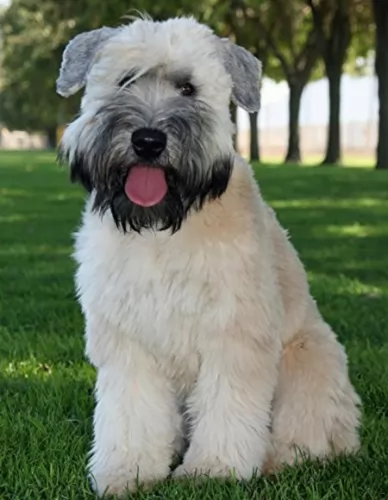 The Soft Coated Wheaten Terrier has always made an excellent farm dog, but today he is more suited as pet and companion.
The Soft Coated Wheaten Terrier has always made an excellent farm dog, but today he is more suited as pet and companion.
He adapts easily to life in the city or the countryside. Wherever he is, he will need his exercise. He also longs to be an active part of his human family, and then he’s happy, lively, social and friendly and is a great playmate for children.
 There are a few health issues that the Schweizer Laufhund is prone to. As an ancient breed there is not a lot of genetic evidence of breed health issues but there is more recent reporting.
There are a few health issues that the Schweizer Laufhund is prone to. As an ancient breed there is not a lot of genetic evidence of breed health issues but there is more recent reporting.
• PRA (Progressive Retinal Atrophy) – hereditary – can result in blindness.
• Ectropion and Entropion – eyelid misalignments either inward or outward. Can be corrected with surgery.
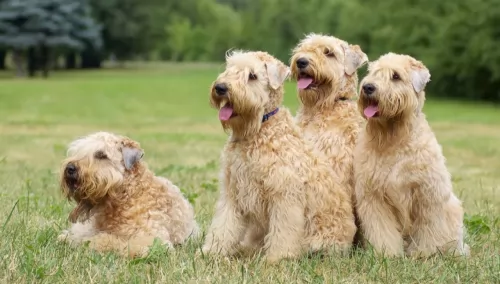 When you bring a Wheaten Terrier into your home, you’re not likely to have too many vet fees as he tends to be a healthy dog breed, being able to reach 13, 14 or 15 years of age with good care.
When you bring a Wheaten Terrier into your home, you’re not likely to have too many vet fees as he tends to be a healthy dog breed, being able to reach 13, 14 or 15 years of age with good care.
Look out for a dog ailment known as Protein-losing enteropathy (PLE). This is a condition where the dog isn’t able to properly absorb protein in the digestive tract, so that it is passed in their stools.
It can be fatal, but if caught early, some dietary changes can keep it under control.
Also, look out for inflammatory bowel disease. This disease occurs when the stomach of the dog has a large number of inflammatory cells which can change the lining of the digestive tract, preventing the normal absorption of food.
 . Feeding the puppy – as an active working breed they should be fed a high quality active or working breed kibble formula.
. Feeding the puppy – as an active working breed they should be fed a high quality active or working breed kibble formula.
2.Feeding the adult - the adult should be fed the same active or working breed formula, only in an adult formulation.
4. Games and Exercises – this active breed does require a lot of daily exercise. Take them on at least one good, quick walk per day and give them a fenced yard to play in. They love hunting training and field trials along with activities like barn hunt. They love to run alongside as you bike or jog.
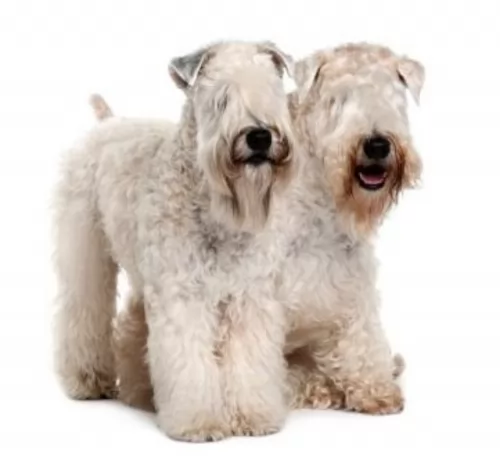 Brush your pet’s silky coat twice a week. Such a silky coat can get all tangled and matted. If you prefer, many people opt to rather have the Wheaten’s coat professionally clipped as then it is easier to handle. They like to have the hair clipped that hangs over the dog’s eyes.
Brush your pet’s silky coat twice a week. Such a silky coat can get all tangled and matted. If you prefer, many people opt to rather have the Wheaten’s coat professionally clipped as then it is easier to handle. They like to have the hair clipped that hangs over the dog’s eyes.
Other grooming tasks require you to check inside his ears for redness which could indicate an infection. Trim his nails and check him over for ticks and fleas.
Have your Wheatie trained and socialized as he is a stubborn dog breed and you want him to be well mannered and obedient.
Terriers like this are energetic dogs and he is going to need exercise every day. A walk for a dog is always a welcome experience as it gives him the opportunity to sniff around and pick up new smells. Play ball- or frisbee games with him as this can tire him out a bit.
If your dog shows signs of illness, get him to the vet. He is such a feisty dog that it can be unbearable to see him out of sorts.
Terriers are energetic dogs so if you feed your dog one of the commercial dog foods, make sure the label indicates what food it is. This is because the foods are manufactured according to the type of dog it is, its age, size and energy levels.
Always try and go for the high quality foods which don’t have all those unhealthy ingredients in them. Try to include some home-made food – nothing exotic and spicy – just plain, wholesome food that won’t upset his stomach.
Boiled chicken, brown rice or pasta and spinach, sweet potatoes and carrots is super tasty and nutritious. You can chop it up and add it to your pet’s kibble twice a week.
Try and include a little bit of raw meat to his diet occasionally as this can go towards ensuring he doesn’t get skin diseases. Always ensure he has a constant supply of fresh, cool water available.